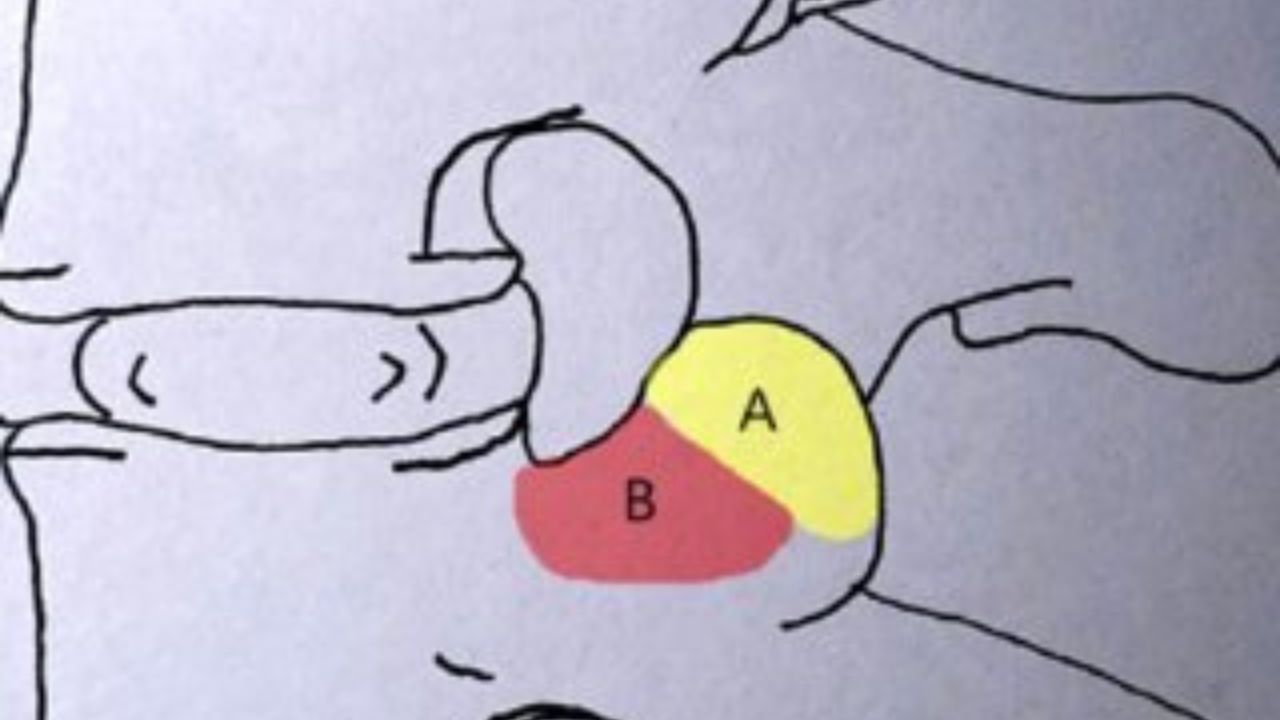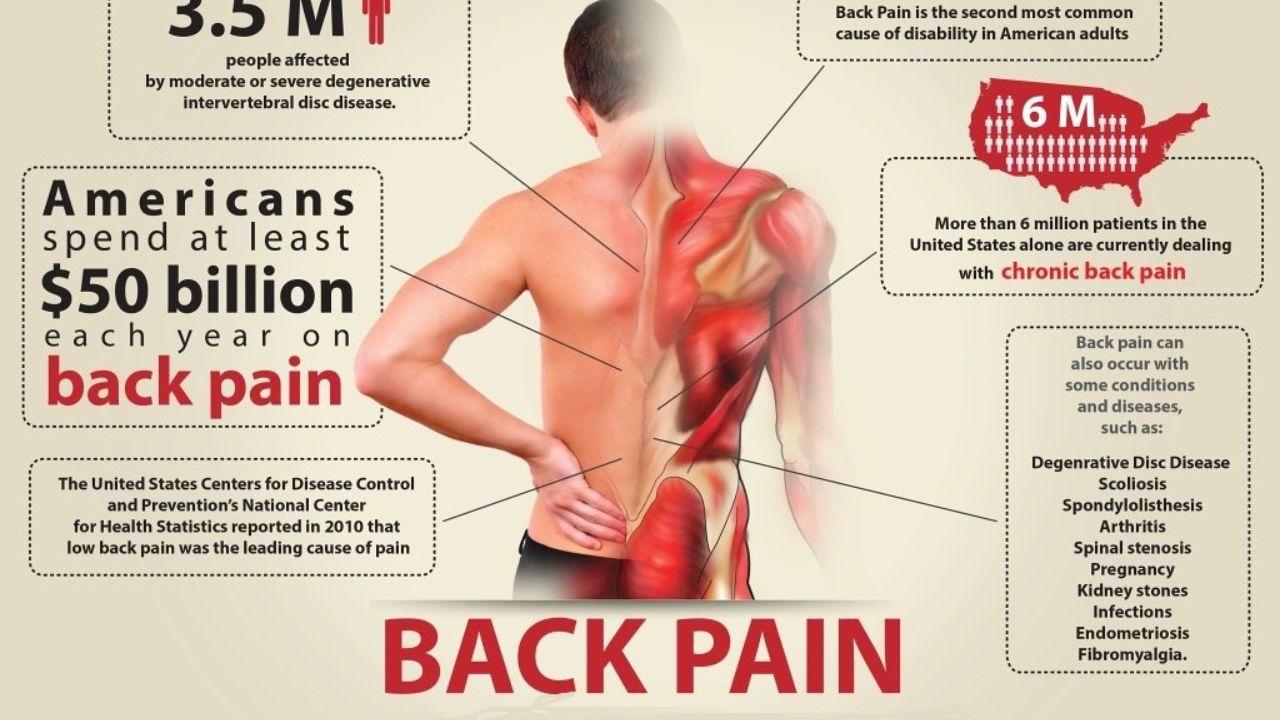
Welcome to '12 Ways Nutrition Influences Back Pain: A Comprehensive Guide.'
In this evidence-based article, we explore the crucial role nutrition plays in managing and alleviating back pain. Backed by scientific research, we delve into the impact of:
- Inflammation
- Sugar
- Processed foods
- Essential nutrients
- Vitamin D
- Hydration
- Anti-inflammatory foods
- Caffeine
- Food sensitivities
Discover practical strategies for incorporating a balanced diet that supports spine health, enabling you to regain freedom from back pain.
The Role of Inflammation in Back Pain
Inflammation plays a significant role in the development and exacerbation of back pain. When the body experiences stress, whether it be physical or psychological, it triggers an inflammatory response. This response is the body's way of protecting itself and promoting healing. However, chronic stress can lead to chronic inflammation, which can contribute to the persistence and intensity of back pain.
Additionally, the relationship between posture and back pain is well-established. Poor posture, such as slouching or hunching over, can put added stress on the muscles and ligaments of the back, leading to discomfort and pain. Maintaining good posture, on the other hand, can help distribute the load evenly across the spine, reducing the risk of developing back pain.
Understanding the role of inflammation and the impact of stress and posture on back pain is crucial for individuals seeking freedom from this debilitating condition. By managing stress, adopting good posture habits, and addressing any underlying inflammation, individuals can take proactive steps towards alleviating and preventing back pain.
The Impact of Sugar and Processed Foods on Back Pain
Sugar and processed foods have been found to have a significant impact on back pain. High sugar intake can lead to inflammation in the body, which can exacerbate back pain.

Additionally, processed foods often contain high levels of sugar and artificial additives, further contributing to inflammation and potentially worsening back pain.
It is important to be mindful of our sugar and processed food consumption to support spinal health and alleviate back pain.
Sugar Inflammation Connection
Consuming excessive amounts of sugary and processed foods can contribute to the exacerbation of back pain. Sugar addiction is a real phenomenon, and it can have negative effects on our overall health, including our back. When we consume high amounts of sugar, our bodies produce more insulin, which can lead to inflammation.
Inflammation is a common cause of back pain, as it can irritate nerves and tissues in the back. Additionally, excessive sugar intake can contribute to weight gain and obesity, which are major risk factors for back pain.
Making dietary changes by reducing sugar and processed food consumption can help alleviate back pain and improve overall health. Opting for whole, nutrient-dense foods can provide the necessary nutrients for a healthy back and reduce inflammation.
Processed Foods and Inflammation
Eating a significant amount of processed foods and regularly consuming high levels of sugar can significantly contribute to the exacerbation of back pain.
Processed foods, such as fast food, are often loaded with food additives, preservatives, and artificial ingredients that can cause inflammation in the body. These additives are known to trigger an immune response, leading to increased inflammation, which can worsen existing back pain.

Moreover, the high sugar content in processed foods can also contribute to inflammation. When consumed in excess, sugar causes a spike in blood sugar levels, leading to increased production of inflammatory molecules. This chronic inflammation can further aggravate back pain.
Therefore, it is important to limit the consumption of processed foods and opt for whole, unprocessed foods to reduce inflammation and alleviate back pain.
Sugar and Spinal Health
Significantly, the excessive consumption of sugar and processed foods has a profound impact on spinal health and can contribute to the development and aggravation of back pain. Studies have shown that a high intake of sugar can lead to inflammation in the body, which can directly affect the spine and surrounding tissues.
Excess sugar consumption can also contribute to weight gain and obesity, which puts additional stress on the spine and can lead to pain and discomfort. Additionally, sugar has been found to reduce the production of collagen, a protein that is essential for maintaining the strength and elasticity of spinal discs.
Therefore, reducing sugar consumption can play a crucial role in improving spinal health and managing back pain. Opting for healthier alternatives and adopting a balanced diet is essential for maintaining a healthy spine and minimizing the risk of back pain.
Essential Nutrients for Spine Health
One must understand the importance of incorporating essential nutrients into their diet to promote spine health. A well-balanced diet that includes these essential spinal nutrients can help maintain the health and integrity of the spine.
Calcium is crucial for strong bones, including the vertebrae in the spine. It can be found in dairy products, leafy greens, and fortified foods.

Vitamin D aids in calcium absorption and can be obtained from sunlight, fortified foods, and fatty fish.
Omega-3 fatty acids have anti-inflammatory properties and can be found in fish, flaxseeds, and walnuts.
Magnesium is essential for muscle function and can be found in nuts, seeds, and whole grains.
Lastly, antioxidants, found in fruits and vegetables, help reduce inflammation and oxidative stress in the spine.
Incorporating these spine health nutrients into your diet can help support a healthy spine and reduce the risk of back pain.
The Connection Between Vitamin D and Back Pain
The link between vitamin D and back pain has been extensively studied and shows a potential correlation between low levels of vitamin D and increased incidence of back pain.
Vitamin D is an essential nutrient that plays a crucial role in maintaining bone health and muscle function. Research suggests that vitamin D deficiency may contribute to the development or worsening of back pain.

Studies have shown that individuals with low levels of vitamin D are more likely to experience chronic back pain compared to those with adequate levels.
To address this issue, it is important to ensure sufficient vitamin D intake through sunlight exposure or dietary sources such as fatty fish, fortified dairy products, and supplements.
Incorporating back pain relief techniques such as regular exercise, maintaining good posture, and practicing stress management can also help alleviate symptoms.
Hydration and Its Effects on Back Pain
Proper hydration is crucial for maintaining overall health. It also plays a significant role in managing back pain. Dehydration can worsen back pain by causing muscle cramps, reducing nutrient delivery to the spinal discs, and increasing inflammation. Staying hydrated is essential to support the health of the spine and alleviate back pain.
Dehydration Worsens Back Pain
Hydration plays a crucial role in exacerbating back pain. When the body is dehydrated, it can lead to a decrease in the elasticity of the spinal discs, which act as shock absorbers for the spine. This can result in increased pressure on the discs, causing them to bulge or herniate and potentially compressing the spinal nerves.
To prevent dehydration and promote spinal health, it is important to prioritize hydration. Here are some key points to consider:
- Drink an adequate amount of water throughout the day to maintain hydration levels.
- Avoid excessive consumption of caffeinated and sugary beverages, as they can contribute to dehydration.
- Incorporate hydrating foods into your diet, such as fruits and vegetables.
- Stay mindful of your water intake during physical activities or when exposed to hot weather.
Importance of Staying Hydrated
Maintaining proper hydration is essential for preventing and alleviating back pain. Dehydration can exacerbate existing back pain and lead to muscle cramps, stiffness, and reduced flexibility. When the body is dehydrated, the intervertebral discs, which act as shock absorbers between the vertebrae, can become compressed and lose their ability to cushion the spine effectively.

To prevent dehydration and its negative effects on back pain, it is important to drink an adequate amount of water throughout the day. The National Academies of Sciences, Engineering, and Medicine recommends a daily water intake of about 3.7 liters (125 ounces) for men and 2.7 liters (91 ounces) for women. However, individual water needs may vary depending on factors such as physical activity, climate, and overall health.
It is important to prioritize hydration and ensure that you are drinking enough water to support your back health.
The Role of Omega-3 Fatty Acids in Alleviating Back Pain
While there is ongoing research on the topic, it is believed that omega-3 fatty acids may play a beneficial role in alleviating back pain. Omega-3 fatty acids are a type of polyunsaturated fat that the body cannot produce on its own. They are primarily found in fatty fish such as salmon, mackerel, and sardines. However, for those who do not consume fish regularly, omega-3 supplements are available.
Here are three key points to consider regarding the role of omega-3 fatty acids in alleviating back pain:
- Omega-3 fatty acids possess anti-inflammatory properties that can help reduce inflammation in the body, including the back.
- These fatty acids may promote joint health and improve mobility, which can alleviate back pain.
- Omega-3 fatty acids have been shown to enhance nerve function and reduce nerve-related pain, which can be beneficial for individuals experiencing back pain.
Incorporating dietary sources of omega-3 fatty acids or taking omega-3 supplements may be a practical approach to potentially alleviate back pain.
The Influence of Gut Health on Back Pain
The gut-brain connection plays a significant role in the experience of pain, including back pain. Research has shown that disturbances in gut health, such as dysbiosis or leaky gut syndrome, can contribute to chronic inflammation in the body, which can in turn lead to back pain.
Understanding and addressing gut health may therefore be an important aspect of managing and preventing back pain.

Gut-Brain Connection and Pain
Numerous studies have shown a strong correlation between poor gut health and the prevalence of back pain. The gut-brain axis, which refers to the bidirectional communication between the digestive system and the brain, plays a crucial role in influencing pain perception, including back pain. The microbiome, the collection of microorganisms residing in the gut, also plays a significant role in this connection.
The gut-brain axis: The gut and the brain are connected through a complex network of nerves, hormones, and immune system molecules. Disruption in this communication can contribute to the development and persistence of pain, including back pain.
Microbiome and pain: The gut microbiome plays a critical role in modulating the immune system and influencing pain sensitivity. Imbalances in the microbiome, such as dysbiosis or overgrowth of harmful bacteria, can contribute to inflammation and pain, potentially leading to back pain.
Therapeutic interventions: Strategies that target gut health, such as dietary changes, probiotics, and prebiotics, have shown promise in managing pain, including back pain. By improving gut health, these interventions can potentially alleviate symptoms and improve overall well-being.
Understanding the gut-brain connection and the influence of gut health on back pain is essential for developing effective treatment and management strategies. By addressing gut health, individuals may have the opportunity to reduce their back pain and improve their quality of life.
Inflammation and Back Pain
By understanding the relationship between gut health and inflammation, we can gain insight into how it influences back pain.
Inflammation is the body's natural response to injury or infection, but chronic inflammation can contribute to various health issues, including back pain.

Poor gut health can lead to increased inflammation throughout the body, including the back. One of the main culprits in promoting inflammation is a diet high in sugar and processed foods.
Consuming excessive amounts of sugar can trigger an inflammatory response and lead to weight gain, which puts extra strain on the back. Processed foods, on the other hand, are often high in trans fats and artificial additives, which can also promote inflammation.
Therefore, it is essential to prioritize a healthy diet and maintain good gut health to reduce inflammation and alleviate back pain.
The Importance of Maintaining a Healthy Weight for Back Pain Relief
Maintaining a healthy weight is crucial for achieving back pain relief. Excess weight puts added stress on the spine, increasing the risk of developing back pain or exacerbating existing conditions.
Here are three key reasons why maintaining a healthy weight is important for back pain relief:
The role of exercise in back pain relief: Engaging in regular physical activity helps strengthen the muscles that support the spine, improving overall posture and reducing the risk of back pain. Exercise also promotes flexibility and increases blood flow to the spinal discs, aiding in their nutrition and preventing degeneration.
The connection between stress and back pain: Stress can contribute to muscle tension, leading to back pain. Maintaining a healthy weight through a balanced diet and regular exercise can help reduce stress levels and alleviate the associated back pain.

Reduced pressure on the spine: Excess weight places additional pressure on the spine, leading to compression of the discs and potential nerve impingement. By maintaining a healthy weight, the spine is relieved of this excessive pressure, reducing the risk of back pain and related complications.
Anti-inflammatory Foods to Include in Your Diet for Back Pain Relief
Importantly, incorporating anti-inflammatory foods into your diet can provide relief from back pain. Chronic inflammation is often associated with back pain, and consuming foods that have natural anti-inflammatory properties can help alleviate symptoms.
Some of the top anti-inflammatory foods to include in your diet are fatty fish, such as salmon and sardines, which are rich in omega-3 fatty acids. Other options include fruits and vegetables like berries, leafy greens, and cruciferous vegetables, which are packed with antioxidants and anti-inflammatory compounds.
Additionally, spices like turmeric and ginger have been shown to have potent anti-inflammatory effects. It is also worth considering incorporating anti-inflammatory supplements, such as fish oil or curcumin, into your daily routine.
The Impact of Caffeine and Back Pain
Caffeine, a common stimulant found in many beverages and foods, can have a significant impact on back pain. While caffeine is known for its ability to increase alertness and energy levels, it can also affect spinal health in various ways.
Here are three important points to consider regarding caffeine intake and its impact on back pain:
Caffeine can increase muscle tension: Consuming large amounts of caffeine can lead to increased muscle tension, including the muscles in the back. This can potentially exacerbate existing back pain or contribute to its development.

Caffeine may interfere with sleep: Poor sleep quality is often associated with back pain. Caffeine has a stimulating effect that can disrupt sleep patterns, potentially leading to inadequate rest and worsening of back pain symptoms.
Caffeine can affect bone health: Studies have shown that excessive caffeine consumption may contribute to a decrease in bone mineral density, potentially increasing the risk of osteoporosis and related spinal issues.
Considering the potential impact of caffeine on back pain and spinal health, it is important for individuals with back pain to moderate their caffeine intake and consider alternative beverages or foods that provide energy without the potential negative effects.
How Food Sensitivities and Allergies Can Aggravate Back Pain
In addition to caffeine, individuals with back pain should be aware of how food sensitivities and allergies can exacerbate their symptoms. Food intolerances can cause inflammation in the body, leading to increased pain and discomfort in the back.
Certain foods can act as dietary triggers, triggering an immune response in sensitive individuals. Common culprits include gluten, dairy, soy, and nightshade vegetables. Eliminating these trigger foods from the diet can help reduce inflammation and alleviate back pain.
It is important to identify food sensitivities through an elimination diet or allergy testing to determine the specific triggers. Additionally, adopting an anti-inflammatory diet rich in fruits, vegetables, and omega-3 fatty acids can help reduce inflammation and support overall back health.
The Benefits of a Balanced Diet for Managing Back Pain
A well-rounded diet offers numerous advantages in effectively managing back pain. Consuming nutrient-rich meals can provide the necessary vitamins and minerals that support overall spinal health and reduce inflammation.

Here are some benefits of a balanced diet for managing back pain:
Weight management: Maintaining a healthy weight through a balanced diet can alleviate pressure on the spine and reduce the risk of developing or worsening back pain.
Increased bone strength: A diet rich in calcium and vitamin D can promote strong bones, reducing the likelihood of fractures and conditions like osteoporosis, which can contribute to back pain.
Improved muscle health: Adequate protein intake supports muscle strength and repair, preventing muscle imbalances and reducing strain on the back.
Frequently Asked Questions
Can Stress and Anxiety Contribute to Back Pain?
Stress and anxiety can contribute to back pain due to the mind-body connection. Stress management techniques, such as relaxation exercises and cognitive-behavioral therapy, can help alleviate symptoms and improve overall well-being.
Are There Any Specific Exercises or Stretches That Can Help Alleviate Back Pain?
Exercises and stretches can help alleviate back pain by improving flexibility, strengthening muscles, and reducing inflammation. Examples include yoga, Pilates, and specific stretches targeting the back, such as child's pose and cat-cow stretch.
How Does Smoking Affect Back Pain?
Smoking has been shown to have a negative impact on back pain. Studies indicate that smoking increases the risk of developing chronic pain conditions, including back pain. Quitting smoking may help alleviate back pain symptoms.

Is There a Link Between Back Pain and Certain Medications or Supplements?
Medication interactions and the use of herbal remedies have been studied for their potential link to back pain. Research suggests that certain medications and supplements may have an impact on back pain, and it is important to be aware of potential interactions.
Can Poor Posture Worsen Back Pain?
Poor posture can worsen back pain by placing extra strain on the spine and surrounding muscles. Incorporating ergonomic solutions, such as maintaining proper alignment and using supportive furniture, can help alleviate discomfort and improve overall posture.
 Mobility trainingHome Fitness RecoverySports Injury PreventionPersonal Physical TherapyOrthopedic SolutionsPrivacy PolicyTerms And Conditions
Mobility trainingHome Fitness RecoverySports Injury PreventionPersonal Physical TherapyOrthopedic SolutionsPrivacy PolicyTerms And Conditions
